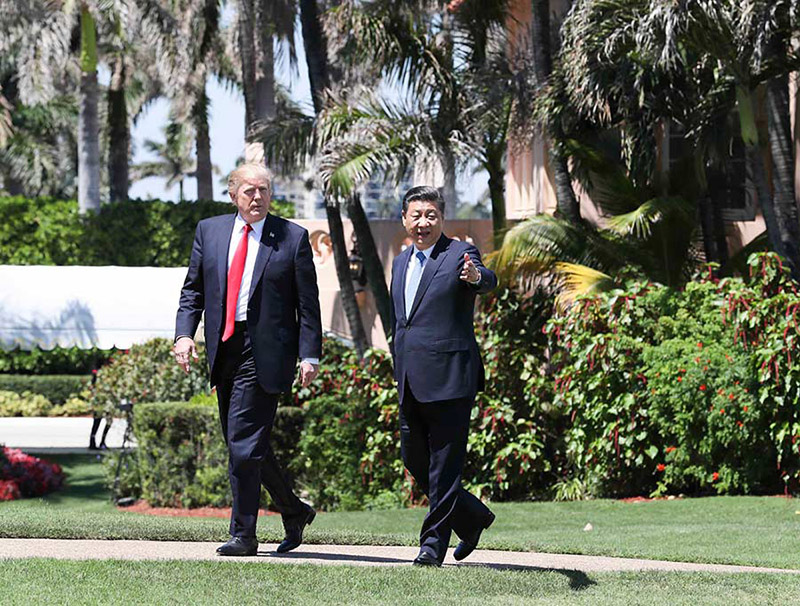Media Report

- The Financial Times reports: "China will offer the Trump administration better market access for financial sector investments and US beef exports to help avert a trade war, according to Chinese and US officials involved in talks between the two governments. US President Donald Trump and Xi Jinping, his Chinese counterpart, decided at their first meeting in Florida last week that they needed rushed trade negotiations to produce results within 100 days. The two concessions on finance and beef are relatively easy for Beijing to make...The concession to allow majority foreign ownership was discussed during Barack Obama's administration, when Chinese and US negotiators held several rounds of talks about a bilateral investment treaty, or BIT...'China was prepared to [raise the investment ceilings] in the BIT but those negotiations were put on hold [after Trump's election victory],' said one Chinese official involved in the talks. 'Had Obama been in office for another six months we would have gotten there.' "
- The Washington Post comments: "President Trump and Chinese President Xi Jinping have now completed their first summit. Observers on both sides seem to be relieved. If no diplomatic breakthroughs on major issues were achieved, it is also the case that there were no outward displays of truculence from either side. Neither high hopes nor great fears have been realized. This leaves the question of where economic relations between the United States and China are going and where the United States should want to take them...focusing on China's trade deficit with the United States is largely misguided. Yes, China subsidizes various exports to the rest of the world in a number of ways. But if the United States succeeds in stopping the subsidies or blocking the subsidized products, the result will be that companies will shift production to Vietnam and other low-wage countries...It is difficult to overestimate the extent to which China is seeking to project soft power around the world by economic means...This investment will, over time, secure Chinese access to raw materials, allow Chinese firms to gain economies of scale and help China to win friends....A truly strategic U.S.-China economic dialogue would revolve around the objectives of global cooperation and the respective roles of the two powers."
- The New York Times reports: "China's Ministry of Public Security has barred the wife of a detained Taiwan-born rights activist from flying to Beijing on Monday, adding to the drama surrounding the man's disappearance after he entered China more than three weeks ago. The wife, Lee Ching-yu, said at a news conference at Taoyuan International Airport, in northern Taiwan, that her mainland travel permit had been canceled by China, making her ineligible to board her Monday afternoon flight to seek answers about the whereabouts and status of her husband, Lee Ming-cheh. Ms. Lee said she had not received an explanation for the cancellation of her permit...The denial of any contact with relatives or a lawyer has left Ms. Lee fearing for her husband's well-being. One of the objectives of her trip to Beijing was to deliver medication he takes for high blood pressure. 'I'm extremely worried,' she said. 'I'm extremely concerned.' "
Calendar
- 2017-04-09 Trade War Averted as China and US Agree 100-day Plan
- 2017-04-07 At U.S.-China summit, Trump presses Xi on trade, North Korea; progress cited
- 2017-04-06 Signs point away from Trump labelling China currency manipulator
- 2017-04-05 Trump and China: Ahead of Summit, Both Sides Try to Reset Volatile Relationship
- 2017-04-04 Trump-Xi meeting watched for clues of future relationship
- 2017-04-03 What those papers Trump left on his desk reveal about his trade policy
- 2017-03-30 Climate change: China calls US 'selfish' after Trump seeks to bring back coal
- 2017-03-29 China Poised to Take Lead on Climate After Trump’s Move to Undo Policies
- 2017-03-28 China able to deploy warplanes on artificial islands any time: U.S. think tank
- 2017-03-27 China’s influence on global finance grows as US scales back input
News
- The Financial Times China offers concessions to avert trade war with US
- The New York Times Wife of Detained Activist From Taiwan Is Barred From China
- The Guardian China offers rewards to root out foreign spies
- Bloomberg China's Changing Economy Helps Explain Taming of Trump's Threats
- The Washington Post Chinese insurance regulator under graft investigation
- Reuters Freight train to leave Britain on long haul for China
- The Wall Street Journal Trump, China, and the Art of Easy Promises
- The New York Times China Investigates Regulator of Fast-Moving Insurance Industry
- The Wall Street Journal China's HNA Group Offers to Buy Singapore's CWT
- The Washington Post China says navy rescues ship from pirates, omits Indian role
- Reuters China, South Korea discuss more sanctions on North Korea amid talk of Trump action
- The Financial Times Blackwater founder Erik Prince eyes opportunities with China
- Bloomberg Casinos, Booze and Watches: China's Vice Stocks Are Back
Commentary
- The Washington Post: Opinions The most important economic challenge that China poses
- TIME Unilateral Action by Trump on North Korea Will Simply Add to an Already Intractable Problem
- Forbes Taiwan Is Using A Get-Rich-Quick Scheme From China To Grow Its Slow Economy
- The Washington Post: Wonkblog Trump considers investigation of international trade partners
- Quartz Beijing will give its citizens a $72,000 reward if they catch a foreign spy
- The Center on Foreign Relations So, Is China Pegging to the Dollar or to a Basket?
- The National Interest The U.S. Army Is Getting Ready for a Tough Reality: Battling Russian or Chinese Weapons
